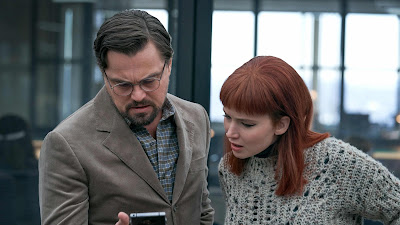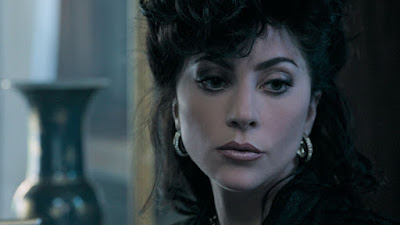As previously explained lamented in other posts, I got through my time in the Roman COVID hotel through year-end screeners. I watched a lot. And I watched some more when I returned, though my mind was still foggy (not that the fog has necessarily lifted). Writing reviews of all these, it just feels like too much, except perhaps in special circumstances. But I did jot down notes at the end of each viewing to preserve my initial reaction and mindset, at least, and so will, as writer brain fog permits, type up some drivel on those movies in capsule form. We begin today with “The Power of the Dog” (YES), “Don’t Look Up” (NOPE), God help me, and “House of Gucci” (GAGA).
The Power of the Dog: Though it was released almost 100 years after the movie was set, Joshua Ray Walker’s country tune “Cowboy” nevertheless kept echoing in my head throughout Jane Campion’s “Power of the Dog”, describing a modern-day dude playing at being some rough-hewn buckaroo. The song is not exactly a one-to-one for Benedict Cumberbatch’s performance as cattle-driving, bathing agnostic Phil Burbank, but it’s close. An early moment when Cumberbatch has Phil sidle up to a paper flower on the dinner table, his head cocked to one side, really wrapping his lips around a mocking description of the decoration as “puuurty”, is a glorious tell betraying the actor’s exaggerated mannerisms are, in fact, the character’s exaggerated mannerisms. He’s playing cowboy but change is not so much in the wind as within, evoked in a moment where, as he strides along the dusty ground of Big Sky country, Campion cuts to an interior shot, looking out at Phil through the window of a rural home. That change initially seems to arrive in the form of Rose (Kirsten Dunst), bride of his taciturn brother George (Jesse Plemons), brought into Phil’s haven of masculinity. That Campion cuts straight from Phil chastising his brother for settling down to a visceral castration is less effective, really, than the way Phil bullies what he sees as this interloper, glaring at Rose through doorframes at tilted angles, the sounds of his banjo functioning as his own monster movie theme. As this transpires, George gradually just sort of dissolves from the picture and Rose comes undone, Dunst evincing a performance like fragile china breaking before our eyes. That would be that if not for Rose’s son, Peter (Kodi Smit-McPhee). Gangly and fashionable, he appears out of place, not just on the frontier but next to the intimidating Phil. Campion is messing with us, though, just as Peter, in his quiet way, messes with Phil, yielding a showdown that plays out more as subtext than with six-shooters out in the open, strikingly reframing everything we think we know about the look of self-possession.
Don’t Look Up: There’s a throwaway joke in “Don’t Look Up”, Adam McKay’s broad farce fronting as a black comedy in which a comet screaming toward Earth becomes a metaphor for climate change, our irresponsible media and our distracted selves, when we see a photograph of Meryl Streep’s craven POTUS posing with Steven Seagal. It’s supposed to be funny, of course, because Seagal has gone to the right wing dogs, but it made me think of just how much “Don’t Look Up” had in common with Seagal’s vain, finger-wagging (forgotten) 1994 eco thriller “On Deadly Ground.” Indeed, Andrew Sarris once opined that “Responsible art is dead art.” He was talking about “Dr. Strangelove”, a movie which he did not admire as much as some, but which demonstrated how nuclear catastrophe might befall us because all our modes of government were populated by buffoons. There are plenty of buffoons in “Don’t Look Up” but McKay frames the entire movie through two scientists (Leonardo DiCaprio and Jennifer Lawrence) who know better, making them our window into the movie, giving us not so much someone to root with or even identity with as willfully keep us at a remove from the buffoonery, able to point our fingers and say, “They’re stupid.” At least in “The Big Short”, McKay’s farce of the 2008 financial crisis, when Margot Robbie explained mortgage bonds from a bubble bath, the movie was edgy enough to make fun of all of us right to our face. But rather than using jokes and gags to dissect and expose who and what it would skewer, a la his own “Talladega Nights”, McKay is not constructing comedy so much as merely copying and pasting real world situations into the movie to smugly ridicule them. Comedy is not dead, because I’m convinced you could make an entire Romanian New Wave movie just out of the subplot here where Lawrence’s astronomer is baffled by a Pentagon So and So who charges her for free White House snacks, but man, going from Will Ferrell as his foremost comic collaborator to a Bernie Sanders speechwriter might mark McKay’s point of no humor return.
House of Gucci: [Disclaimer: I’m a Little Monster.] Just as Patrizia Reggiani infiltrated the House of Gucci and helped blow it up, so does Lady Gaga as Patrizia Reggiani enter what director Ridley Scott seems to imagine as a semi-stately prestige pic and shake it up. That is not to suggest Gaga is the only one giving a good performance. Adam Driver’s understatement and emergent out-of-his-depth vanity is just right as her husband, Mauricio, and even the wildly ridiculed Jared Leto is pretty good so long as you realize he is singing in the key of a big, sad, tragic clown. Nevertheless, this House of Gucci is really the Haus of Gaga. She effects a woman not of the cultured class who knows she’s not of the cultured class, resenting it and then performing like she belongs anyway, her costuming and gestures growing more and more exaggerated, thwacking a mini spoon against the edge of her espresso cup like she’s bringing the guillotine down on her husband’s mistress’s neck. You can chart the progression through Patrizia’s increasingly batty scenes with a psychic (Salma Hayek), like “Mistress America’s” fortune teller sequence filtered through “Nocturnal Animals.” And even as all the Gucci men and their various advisors bicker over the Gucci brand, what it is and what it should be, it is Patrizia who truly inhabits the name, or thinks she does, spiritually ascending from knock off Gucci to the real thing, concluding by walking not into her close-up, a la Norma Desmond, but into her house and closing the door on reality.







No comments:
Post a Comment